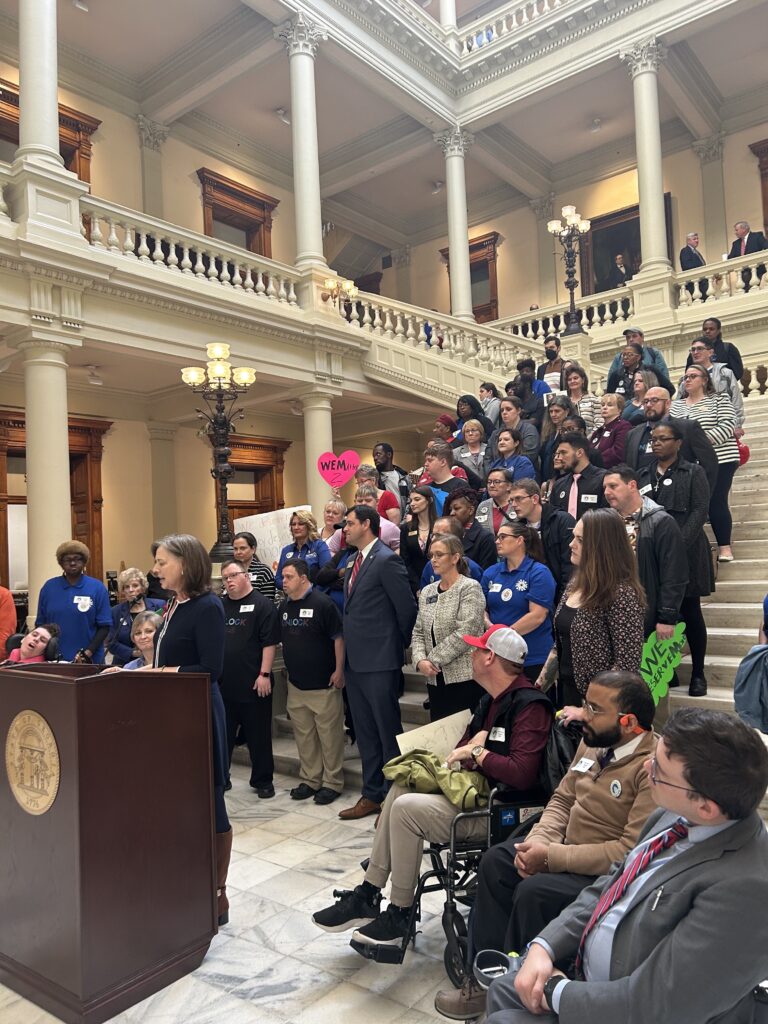
ATLANTA – Georgia disability advocates are calling for the creation of a special commission devoted to the problems Georgians with intellectual and developmental disabilities face.
State Sen. Sally Harrell, D-Atlanta, introduced legislation this week that would create an “Intellectual and Developmental Disabilities Innovation Commission” akin to the highly successful behavioral health commission formed in 2019.
Harrell’s proposal has drawn bipartisan support, including from Republican Senate co-sponsors John Albers of Roswell, Mike Dugan of Carrollton, Chuck Hufstetler of Rome, and Ben Watson of Savannah.
The 22-member commission would include members appointed by the governor, the lieutenant governor, and the speaker of the House of Representatives. Appointees would include, among others, people with intellectual or developmental disabilities and their family members and caregivers.
The commission would be required to focus on proposed changes to state laws and regulations around providing services to people with disabilities.
The Senate Health and Human Services committee will need to approve Harrell’s bill before it can move to the Senate floor for a vote.
Georgia provides funding slots for people with disabilities to receive home and community-based services so they are not segregated in institutions. Those slots are jointly funded by the state and the federal governments, with the state paying about one-third of the cost and the federal government picking up the rest.
Advocates contend the state should dramatically increase the number of slots to meet the needs of Georgians with disabilities. There are currently 7,155 people on the waiting list.
A state Senate study committee co-chaired by Harrell and Albers that met last fall recommended the state increase the number of slots by about 2,400 this year. However, the governor’s budget proposal only includes sufficient funding for an increase of around 250 slots, which follows an increase of about 500 slots from last year’s legislative session.
An additional challenge facing the state is low pay for those who provide care to people with intellectual and developmental disabilities. Advocates say increasing the number of waiver slots is insufficient and that caregivers, often known as “direct support professionals,” must be paid more to ensure people with intellectual and developmental disabilities have the care they need.
Currently, those caregivers only make $10.63 per hour. The study committee recommended increasing the pay to at least $15 per hour to help ensure people with disabilities have the resources they need.
But to truly address the problem, the state should increase the pay to at least $18 an hour, said D’Arcy Robb, the executive director of the Georgia Council on Developmental Disabilities.
A pay increase is sorely needed, said Ryan Whitmire, president and CEO of Developmental Disabilities Ministries. The non-profit organization runs 18 group homes and provides in-home services to people with disabilities. It currently has about a 15% staffing vacancy rate.
Whitmire said he recently lost one of his best staff members –- a woman who is “called” to help people with disabilities — to a job at a retail organization, where she could earn $16 an hour instead of the state-mandated $10.63 an hour at his organization.
The staffer was apologetic, Whitmire said, and noted she would miss her job and the people she cared for. But she simply needed to earn more money to survive.
Because of the low pay and resultant difficulty in retaining staff, Whitmire said his organization ends up paying a lot in overtime to current workers. That added expense prevents the organization from expanding to offer more slots for people who need care, he said.
“This has made it to where we can’t grow,” Whitmire said. “You have to be able to pay wages in order to develop the infrastructure to serve.”
Advocates are calling on lawmakers to find money in the state budget to both increase the pay for caregivers and increase the number of waiver slots.
This story is available through a news partnership with Capitol Beat News Service, a project of the Georgia Press Educational Foundation.